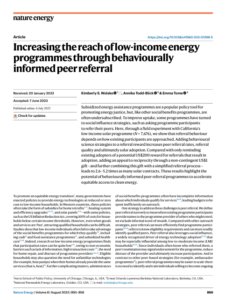Full Title: Increasing the Reach of Low-Income Energy Programs Through Behaviorally-Informed Peer Referral
Author(s): Kimberly S. Wolske, Annika Todd-Blick, and Emma Tome
Publisher(s): Nature Energy
Publication Date: July 6, 2023
Full Text: Download Resource
Description (excerpt):
Subsidized energy assistance programs are a popular policy tool for promoting energy justice, but, like other social benefits programs, are often undersubscribed. To improve uptake, some programs have turned to social influence strategies, such as asking program participants to refer their peers. Here, through a field experiment with California’s low-income solar program (N =7,676), we show that referral behavior depends on how existing participants are approached. Adding behavioral science strategies to a referral reward increases peer referral rates, referral quality, and ultimately solar adoption. Compared to only reminding existing adopters of a potential US$200 reward for referrals that result in adoption, adding an appeal to reciprocity through a non-contingent US$1 gift – and further combining this gift with a simplified referral process – leads to 2.6 to 5.2 times as many solar contracts. These results highlight the potential of behaviorally-informed peer referral programs to accelerate equitable access to clean energy.
